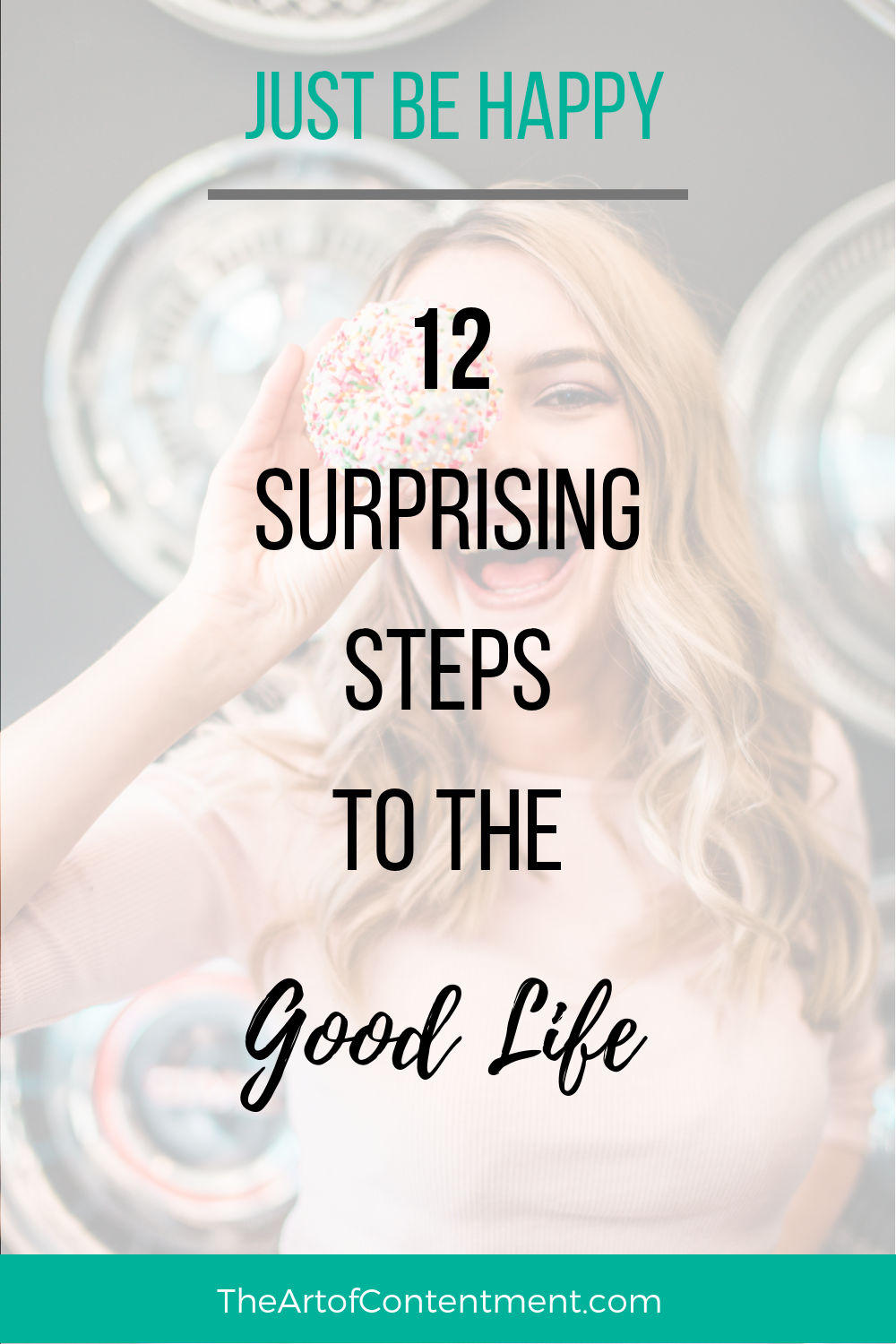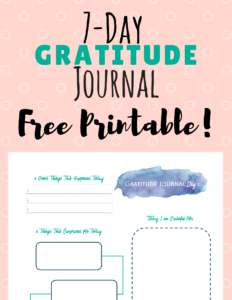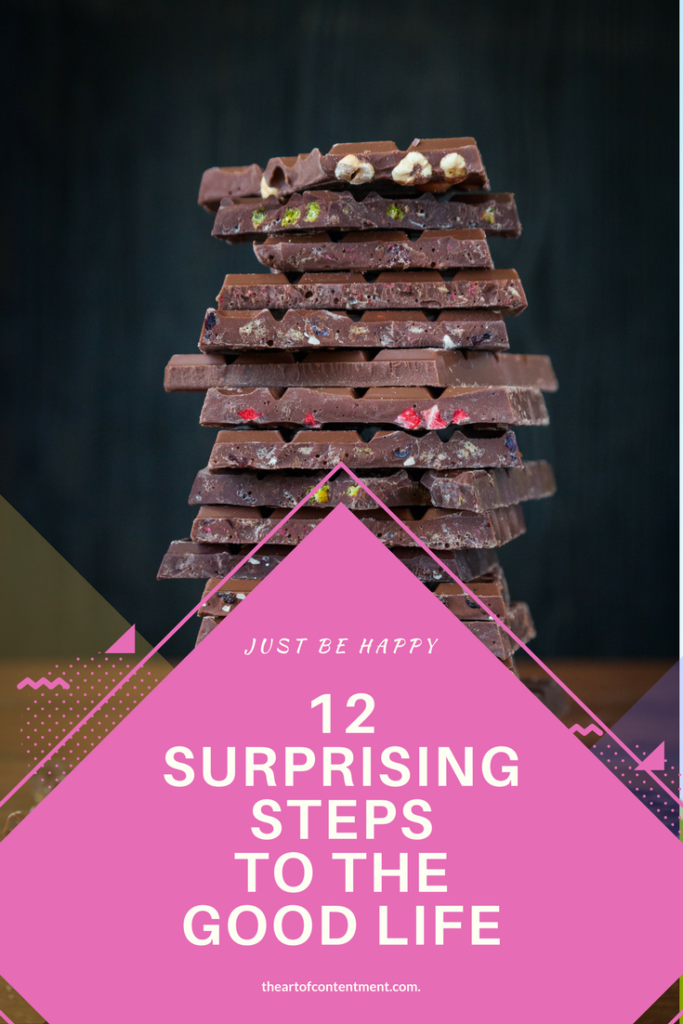What makes you happy? If you’ve already read the intro in parts 1 and 2, just skip it and read the finale!
(Don’t forget to grab your free copy of the 7-Day Gratitude Journal at the bottom of this post.)
 How happy would you be if you won the lottery?
How happy would you be if you won the lottery?
Probably about as happy as you are right now. That’s according to scientific studies in the relatively new field of happiness research.
Everyone wants to be happy. We fantasize about winning the lottery and imagine the house we would build with our new-found riches, or the vacation, or better yet, throwing that resignation letter on our boss’s desk and becoming a full-time artist.
We feel entitled to be happy. For Americans, it’s right there in the Constitution: “…life, liberty, and the pursuit of happiness.”
And when we’re not happy, we want to know why. And how to fix it.
You might even think you know what makes a person happy.
But what does the hard science say?
Thanks to the upsurge in happiness research since the year 2000, now we have a pretty good idea. I dug through research study reports and went half blind reading about statistics and control groups and trying to decipher the study authors’ convoluted, wordy, and overwritten prose. Heaps of research later, the results are in.
Maybe you already know many of the happiness secrets on this list, but some may surprise you.
In parts 1 and 2, I summarized tips 1 through 8. Read on for the last (but not least) ideas to bring you to your best life, now.
9. Never work a day in your life (Find work that you love).
If you’re like the average American, you’ll spend 90,000 to 100,000 hours working in your lifetime (and if you’re a stay-at-home parent, you’ve probably stopped counting).
You’ll also spend the best hours of your day – hours when you’re most awake and the sun is shining – earning a living.
So maybe work should feel a little less like work.
If your job brings chronic stress into your life and leaves you feeling unfulfilled, overworked, bored, and unproductive, start thinking about a change.
Chronic stress will ruin your health, shorten your life, and steal the joy out of the hours you have outside of work.
You may already know what kind of job you really want. Maybe you’ve always loved pottery and your experience as a business manager could be put to good use to develop a handmade pottery studio and school.
Or maybe you’re still trying to figure out what work would be most fulfilling. Here’s a formula: You’ll find it where your passion, skills, and experience intersect with a need in the market.
If there’s something you love to do that uses your talents and skills and people are willing to pay you for it, then you’ve found your life’s work. Just ask yourself: what would I do even if I didn’t get paid for it?
In his book Financial Peace Revisited, personal finance expert Dave Ramsey writes:
“Everyone has some natural talent or aptitude in one or more areas. If you can identify those areas you not only will be happier and perform more successfully in that role, but you will also become better paid for that. Our free-market system pays for performance at some point. When you have a natural talent or aptitude, coupled with desire and experience, the result is productivity plus.”
The best career for you is work that brings you into a mental state psychologists call “flow.”
It’s a pleasurable immersion in your task that completely absorbs your attention and alters your perception of time.
Have you ever been so absorbed in what you were doing that hours passed without you noticing? Maybe you worked through lunch and weren’t even hungry?
If you’ve ever had a hobby or project that brought your mind into flow, you’ve found your ideal work. Take those tasks and figure out how you can use them in your career.
Find your passion and you’ll never work a day in your life.
Even if you can’t quit your current job right away (and you shouldn’t unless you can move into your new career right away or you have 12-16 months of expenses saved, according to finance guru Suze Orman), just starting to plan your dream career will give you a big shot of hope and encouragement. Then start working on those goals and soon your dream career will be your new life.
10. Above all, foster and maintain good relationships.
“The good life is built with good relationships.”
So says Robert Waldinger, the current director of the Harvard Study of Adult Development.
Since 1938, Harvard researchers have been studying the life and health of 268 Harvard men who were sophomores at the time.
It’s the longest study of its kind, and its taught researchers a lot about how you can get the good life.
“The clearest message that we get from this 75-year study is this,” says Waldinger in a Ted Talk in 2016, “good relationships keep us happier and healthier. Period.”
The Harvard study found that social connections are good for us.
People with close relationships are happier, healthier, and live longer. In old age, people’s memories are sharper for longer.
The opposite is true for people without close relationships: lonely people show earlier memory decline, are less happy, and their health declines earlier in mid life.
The Harvard researchers wanted to know what factors predicted that a fifty-year-old man would live to be 80. How about his cholesterol level? Or his weight? Maybe how often he exercises?
To the researchers’ surprise, no physical health measurement predicted longevity.
The unexpected result?
The strongest predictor that a person would live to the age of 80 was the answer to this question when asked at the age of 50: how happy are you with your closest relationships? That’s it.
Surprising? The Harvard study shows us clearly: warm relationships are protective.
The quality of your closest relationships (not the number of friends you have or if you’re in a committed relationship) is the most decisive factor.
And living in high-conflict relationships is bad for us. If you have occasional spats with your partner and worry it will affect your health, it’s probably not a concern. Bickering isn’t a problem, Waldinger notes, if you know that the other person is there for you.
But if your relationship feels more like a battleground, then fight back: get therapy or get out.
In his essay Happiness is the wrong metric, Amitai Etzioni wrote that “human relationships and connections of all kinds contribute more to happiness than anything else.”
Etzioni concluded that human connections are so important that “attending monthly clubs or volunteering just once a month is associated with a change in well being equivalent to a doubling of income.” (Emphasis mine.)
A final note: You must make an effort on relationships throughout your life. When close relationships leave your life – through death, retirement, or a move – make new social connections.
You’ll be happy you did (and you’ll live longer to crow about it).
11. Plug into a higher Power: Connect to God.
I believe human relationships are so important to people because God Himself is relational.
Just as we want to connect with other people, God wants us to have a relationship with Him.
Whether you’re a person of faith, curious but not committed, ambivalent, or a staunch non-believer, the science is clear that people who consider themselves religious or express a belief in God are more satisfied with their lives.
People with deep religious faith are healthier, live longer, divorce less often and have lower rates of crime and suicide.
In fact, religiosity correlates as strongly as income for life satisfaction.
The supportive community of church congregations provide rich social relationships and contribute to wellbeing. If that’s the only thing you get out of this tip, then you’ll still get happy benefits.
But I can only speak for myself when I say that I can’t imagine my life without my most important relationship: God. Because of my relationship with Him, I can die without fear and live with purpose.
If you’re curious or even if you’re skeptical but you want to know more, check out these resources:
- Quiz: Are you a good person? needgod.com
- Hell’s Best Kept Secret – not a teaching on hell, but still my favorite Christian message http://www.wayofthemaster.com/audiolessons.shtml
- FAQs for Seekers and Skeptics http://www.allaboutgod.com/faq/faq-main.htm
- Proverbs 31 Ministries daily devotional for women proverbs31.org
12. Give thanks: Gratitude is a blessed attitude.
“Joy is the simplest form of gratitude.” – Karl Barth
When you’ve had a rough day (or month or year), perhaps the last thing you want to do is sit down and think about all the things you should be grateful for.
Which is exactly what you should do.
As it turns out, gratitude is good for your brain. And if you struggle with depression, it might even help you fight it.
Gratitude can build other positive emotions – and improve depressive symptoms – with the broaden-and-build theory.
When you get negative emotions, your brain narrows your thought-action repertoire to promote quick actions, like fight-or-flight. Don’t think too much – just run!
But when you have a positive emotion, your brain broadens your momentary thought-action repertoire and widens the kinds of thoughts you receive.
Joy can broaden to create the urge to play and to be creative and push your limits, while curiosity makes you want to explore, try new experiences, and expand the self while you’re doing it.
So spend some time thinking about what you’re grateful for, then make a list. You can use this free printable seven-day gratitude journal to get started.

After all this, do you still want to win the lottery?
Yeah, me too.
But if you ever get that lucky, you won’t need your fat bank account to bring you bliss: Your happiness is mostly up to you. So take responsibility and create your own happiness. Invest in yourself with what matters most: God, people, and experiences.
Give yourself and the ones you love the gift of happiness with this simple formula:
- Your happiness is mostly up to you. Use your opportunities to invest in what matters to you.
- Don’t take money too seriously. Once your basic needs are met and you have enough disposable income to make choices for yourself, you have all the money you need to be happy.
- Actively seek to help others. It’s amazing how much good it will do for YOU.
- Set aside a few minutes each day to meditate. You’ll be calmer and less worried, opening your mind for better things to enter.
- Low-exertion exercise is a treat for both your mind and your body. Find an exercise you enjoy and try it.
- Listen to music for peak experiences. Let it take you on a journey and leave you in a better place.
- Doing things, rather than buying things, will make your happiness last longer and will give you pleasurable memories that you can relive and share with others.
- Enjoy the small pleasures in life, like an engrossing book or a meaningful conversation with a friend. Life is made up of all these ordinary moments, so don’t miss them.
- You have skills and interests and passions that make work a lot more like fun. Life will be so much more interesting if you can get paid for what you already love to do.
- Good relationships are protective, so protect them. If you make an effort to foster and maintain good relationships, then you’ll have a much happier life, even into old age.
- We were made to know our creator, and we were made like Him. Seek and see what you find.
- Gratitude helps you persevere through negative events in life, and it sweetens the joyous moments. Gratitude recognizes that you’ve been given something valuable, so acknowledge that you are loved by giving thanks.
